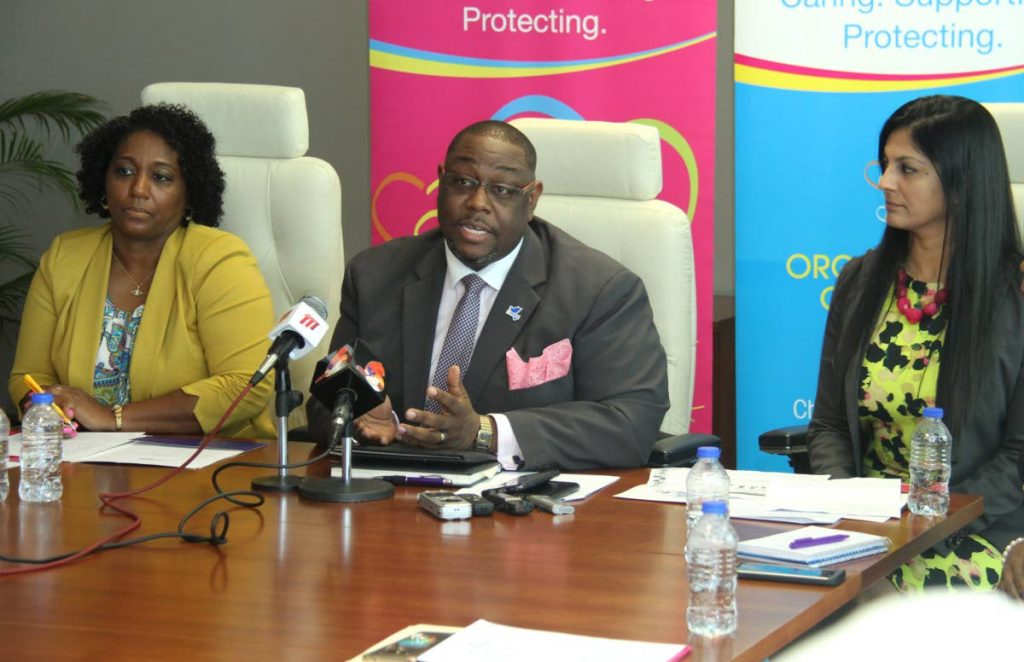‘Adoption no easy matter’

THERE is a common misconception that children at community residents are orphans and easily adopted. They are not. Many have families and it is the priority of the Children’s Authority to reunite these children with their relatives.
So said chairman of the Board of Management of the Authority, Hanif Benjamin yesterday at a press conference at the Ministry of Attorney General and Legal Affairs, Port of Spain.
The press conference was called to clarify issues of adoption after president of the Rapidfire Kidz Foundation, attorney Kevin Ratiram appealed to the public to start adopting children in community homes at the Foundation’s Annual Gala Dinner on September 14.
Ratiram said, “Many of these children would never know what it feels like to sit on a father’s lap. They will never know what it feels like to fall asleep in their mother’s arms or wake up in their mother’s arms. They are destined to remain there (in orphanages) almost forever... Why is it they are not good enough to be part of us, part of our home, our families?”
Benjamin said, “It’s not that you can just walk in a community residence and say, ‘I like this one. Gimme this one. Or I like these two, put these two in a bag. It’s a process and it’s important to understand that process where a child must be freed.”
He said the Authority recently completed its first stage of investigations to determine the number of children at homes that are eligible and could be freed for adoption by the courts. They are now attempting to locate birth parents, or relatives of the children who may want to adopt them.
“Therefore I am appealing to those persons who see their names in the newspapers (Children’s Authority advertisements) or whom we have contacted, who may know of persons we are seeking, please chat with us so we may determine the next step for you and your child.”
Humphrey said from August 2015 to 2019 there were 34 adoptions, approximately eight per year, and they were mostly open adoptions. That means the child already had an established relationship with the parent, was informally in the care of a relative, step parent or godparent, and that parent wanted to formalise the arrangement. In closed adoptions there is no relationship between the PAP and the child, and they were waiting on the Authority to match them.
She assured once the process is completed, time on the waiting list would be cut down and matches could occur “almost immediately.”
Benjamin stressed that caring for a child was not a burden. Instead it gives young people who might have experienced something traumatic, a chance to be in a loving, safe home.
He challenged people to stop requesting babies as the Authority also needed foster parents for those with special needs and teenagers. He said everyone was as teen at some point so there was no reason to be afraid if them. “As a matter of fact, when we talk about some of the success stories, its those teenagers, with a guiding hand and a loving hug, who changed automatically.”
He also encouraged professionals and paraprofessionals to be part of the foster care and adoption system. Asked to clarify his position after the Authority’s press conference, Ratiram told Newsday consideration must be given to the term “available for adoption.” He recognised that the Authority had to apply to the court for children to be declared free for adoption said it was an artificial distinction.
“If no Declaration has been made by the Court to free them for adoption on account that the Authority has not so applied, do we say that that child is not available for adoption? I think that’s an artificial distinction. Failing to apply for such a declaration cannot put such a child into the category of ‘unavailable for adoption’...
“Whilst the term “adoption” has a legal connotation, the practical aspect of adoption is what is material. The issue is whether the child’s circumstances are such that it is necessary for that child to be placed with a family, or parents.”

Comments
"‘Adoption no easy matter’"